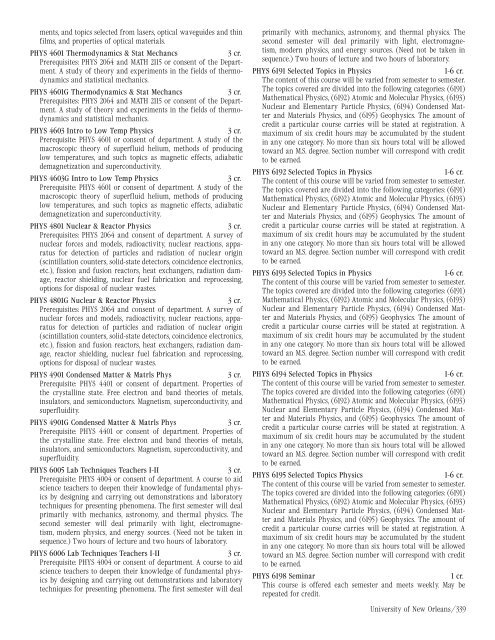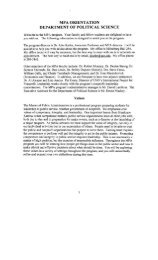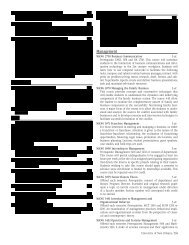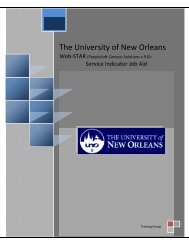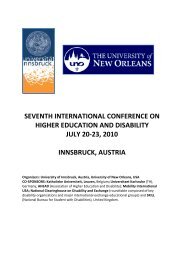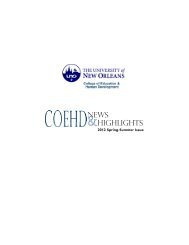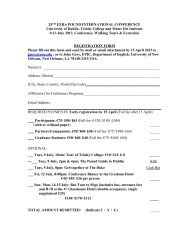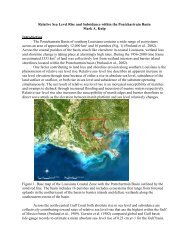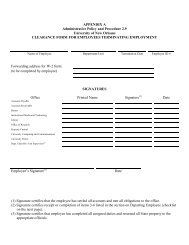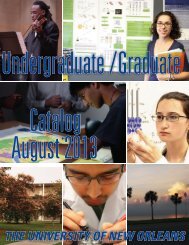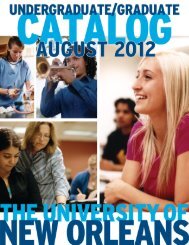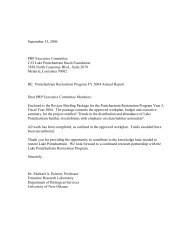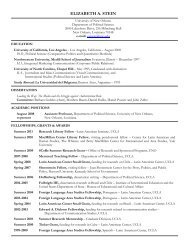Untitled - University of New Orleans
Untitled - University of New Orleans
Untitled - University of New Orleans
Create successful ePaper yourself
Turn your PDF publications into a flip-book with our unique Google optimized e-Paper software.
ments, and topics selected from lasers, optical waveguides and thin<br />
films, and properties <strong>of</strong> optical materials.<br />
PHYS 4601 Thermodynamics & Stat Mechancs<br />
3 cr.<br />
Prerequisites: PHYS 2064 and MATH 2115 or consent <strong>of</strong> the Department.<br />
A study <strong>of</strong> theory and experiments in the fields <strong>of</strong> thermodynamics<br />
and statistical mechanics.<br />
PHYS 4601G Thermodynamics & Stat Mechancs<br />
3 cr.<br />
Prerequisites: PHYS 2064 and MATH 2115 or consent <strong>of</strong> the Department.<br />
A study <strong>of</strong> theory and experiments in the fields <strong>of</strong> thermodynamics<br />
and statistical mechanics.<br />
PHYS 4603 Intro to Low Temp Physics<br />
3 cr.<br />
Prerequisite: PHYS 4601 or consent <strong>of</strong> department. A study <strong>of</strong> the<br />
macroscopic theory <strong>of</strong> superfluid helium, methods <strong>of</strong> producing<br />
low temperatures, and such topics as magnetic effects, adiabatic<br />
demagnetization and superconductivity.<br />
PHYS 4603G Intro to Low Temp Physics<br />
3 cr.<br />
Prerequisite: PHYS 4601 or consent <strong>of</strong> department. A study <strong>of</strong> the<br />
macroscopic theory <strong>of</strong> superfluid helium, methods <strong>of</strong> producing<br />
low temperatures, and such topics as magnetic effects, adiabatic<br />
demagnetization and superconductivity.<br />
PHYS 4801 Nuclear & Reactor Physics<br />
3 cr.<br />
Prerequisites: PHYS 2064 and consent <strong>of</strong> department. A survey <strong>of</strong><br />
nuclear forces and models, radioactivity, nuclear reactions, apparatus<br />
for detection <strong>of</strong> particles and radiation <strong>of</strong> nuclear origin<br />
(scintillation counters, solid-state detectors, coincidence electronics,<br />
etc.), fission and fusion reactors, heat exchangers, radiation damage,<br />
reactor shielding, nuclear fuel fabrication and reprocessing,<br />
options for disposal <strong>of</strong> nuclear wastes.<br />
PHYS 4801G Nuclear & Reactor Physics<br />
3 cr.<br />
Prerequisites: PHYS 2064 and consent <strong>of</strong> department. A survey <strong>of</strong><br />
nuclear forces and models, radioactivity, nuclear reactions, apparatus<br />
for detection <strong>of</strong> particles and radiation <strong>of</strong> nuclear origin<br />
(scintillation counters, solid-state detectors, coincidence electronics,<br />
etc.), fission and fusion reactors, heat exchangers, radiation damage,<br />
reactor shielding, nuclear fuel fabrication and reprocessing,<br />
options for disposal <strong>of</strong> nuclear wastes.<br />
PHYS 4901 Condensed Matter & Matrls Phys<br />
3 cr.<br />
Prerequisite: PHYS 4401 or consent <strong>of</strong> department. Properties <strong>of</strong><br />
the crystalline state. Free electron and band theories <strong>of</strong> metals,<br />
insulators, and semiconductors. Magnetism, superconductivity, and<br />
superfluidity.<br />
PHYS 4901G Condensed Matter & Matrls Phys<br />
3 cr.<br />
Prerequisite: PHYS 4401 or consent <strong>of</strong> department. Properties <strong>of</strong><br />
the crystalline state. Free electron and band theories <strong>of</strong> metals,<br />
insulators, and semiconductors. Magnetism, superconductivity, and<br />
superfluidity.<br />
PHYS 6005 Lab Techniques Teachers I-II<br />
3 cr.<br />
Prerequisite: PHYS 4004 or consent <strong>of</strong> department. A course to aid<br />
science teachers to deepen their knowledge <strong>of</strong> fundamental physics<br />
by designing and carrying out demonstrations and laboratory<br />
techniques for presenting phenomena. The first semester will deal<br />
primarily with mechanics, astronomy, and thermal physics. The<br />
second semester will deal primarily with light, electromagnetism,<br />
modern physics, and energy sources. (Need not be taken in<br />
sequence.) Two hours <strong>of</strong> lecture and two hours <strong>of</strong> laboratory.<br />
PHYS 6006 Lab Techniques Teachers I-II<br />
3 cr.<br />
Prerequisite: PHYS 4004 or consent <strong>of</strong> department. A course to aid<br />
science teachers to deepen their knowledge <strong>of</strong> fundamental physics<br />
by designing and carrying out demonstrations and laboratory<br />
techniques for presenting phenomena. The first semester will deal<br />
primarily with mechanics, astronomy, and thermal physics. The<br />
second semester will deal primarily with light, electromagnetism,<br />
modern physics, and energy sources. (Need not be taken in<br />
sequence.) Two hours <strong>of</strong> lecture and two hours <strong>of</strong> laboratory.<br />
PHYS 6191 Selected Topics in Physics<br />
1-6 cr.<br />
The content <strong>of</strong> this course will be varied from semester to semester.<br />
The topics covered are divided into the following categories: (6191)<br />
Mathematical Physics, (6192) Atomic and Molecular Physics, (6193)<br />
Nuclear and Elementary Particle Physics, (6194) Condensed Matter<br />
and Materials Physics, and (6195) Geophysics. The amount <strong>of</strong><br />
credit a particular course carries will be stated at registration. A<br />
maximum <strong>of</strong> six credit hours may be accumulated by the student<br />
in any one category. No more than six hours total will be allowed<br />
toward an M.S. degree. Section number will correspond with credit<br />
to be earned.<br />
PHYS 6192 Selected Topics in Physics<br />
1-6 cr.<br />
The content <strong>of</strong> this course will be varied from semester to semester.<br />
The topics covered are divided into the following categories: (6191)<br />
Mathematical Physics, (6192) Atomic and Molecular Physics, (6193)<br />
Nuclear and Elementary Particle Physics, (6194) Condensed Matter<br />
and Materials Physics, and (6195) Geophysics. The amount <strong>of</strong><br />
credit a particular course carries will be stated at registration. A<br />
maximum <strong>of</strong> six credit hours may be accumulated by the student<br />
in any one category. No more than six hours total will be allowed<br />
toward an M.S. degree. Section number will correspond with credit<br />
to be earned.<br />
PHYS 6193 Selected Topics in Physics<br />
1-6 cr.<br />
The content <strong>of</strong> this course will be varied from semester to semester.<br />
The topics covered are divided into the following categories: (6191)<br />
Mathematical Physics, (6192) Atomic and Molecular Physics, (6193)<br />
Nuclear and Elementary Particle Physics, (6194) Condensed Matter<br />
and Materials Physics, and (6195) Geophysics. The amount <strong>of</strong><br />
credit a particular course carries will be stated at registration. A<br />
maximum <strong>of</strong> six credit hours may be accumulated by the student<br />
in any one category. No more than six hours total will be allowed<br />
toward an M.S. degree. Section number will correspond with credit<br />
to be earned.<br />
PHYS 6194 Selected Topics in Physics<br />
1-6 cr.<br />
The content <strong>of</strong> this course will be varied from semester to semester.<br />
The topics covered are divided into the following categories: (6191)<br />
Mathematical Physics, (6192) Atomic and Molecular Physics, (6193)<br />
Nuclear and Elementary Particle Physics, (6194) Condensed Matter<br />
and Materials Physics, and (6195) Geophysics. The amount <strong>of</strong><br />
credit a particular course carries will be stated at registration. A<br />
maximum <strong>of</strong> six credit hours may be accumulated by the student<br />
in any one category. No more than six hours total will be allowed<br />
toward an M.S. degree. Section number will correspond with credit<br />
to be earned.<br />
PHYS 6195 Selected Topics Physics<br />
1-6 cr.<br />
The content <strong>of</strong> this course will be varied from semester to semester.<br />
The topics covered are divided into the following categories: (6191)<br />
Mathematical Physics, (6192) Atomic and Molecular Physics, (6193)<br />
Nuclear and Elementary Particle Physics, (6194) Condensed Matter<br />
and Materials Physics, and (6195) Geophysics. The amount <strong>of</strong><br />
credit a particular course carries will be stated at registration. A<br />
maximum <strong>of</strong> six credit hours may be accumulated by the student<br />
in any one category. No more than six hours total will be allowed<br />
toward an M.S. degree. Section number will correspond with credit<br />
to be earned.<br />
PHYS 6198 Seminar<br />
1 cr.<br />
This course is <strong>of</strong>fered each semester and meets weekly. May be<br />
repeated for credit.<br />
<strong>University</strong> <strong>of</strong> <strong>New</strong> <strong>Orleans</strong>/339


